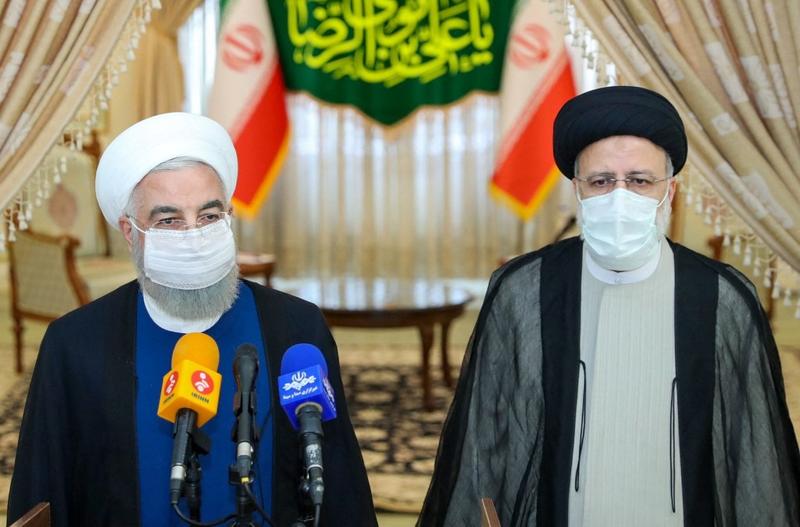 A handout picture provided by the Iranian presidency on June 19, 2021, shows outgoing President Hassan Rouhani (left) taking in part in a press conference with President-elect Ebrahim Raisi (right) during his visit to congratulate the ultraconservative cleric on winning the presidential election. Ebrahim Raisi was declared the winner Saturday of Iran's presidential election. (STRINGER / IRANIAN PRESIDENCY / AFP)
A handout picture provided by the Iranian presidency on June 19, 2021, shows outgoing President Hassan Rouhani (left) taking in part in a press conference with President-elect Ebrahim Raisi (right) during his visit to congratulate the ultraconservative cleric on winning the presidential election. Ebrahim Raisi was declared the winner Saturday of Iran's presidential election. (STRINGER / IRANIAN PRESIDENCY / AFP)
Ebrahim Raisi swept to a landslide win in Iran’s presidential election as world powers attempt to revive a nuclear deal that could see it return to global oil markets.
While the 60-year-old’s ascension could complicate efforts to restart the 2015 accord to limit the country’s atomic activity, it’s not expected to derail them because that policy is decided by Supreme Leader Ayatollah Ali Khamenei. The European Union said the talks will resume Sunday.
Foreign Minister Mohammad Javad Zarif said “the foreign policy of Iran, which is based on consensus, will continue,” after results showed Ebrahim Raisi securing 62 percent of ballots cast
Judiciary chief Raisi, who was elected after the lowest voter turnout in a presidential election in the Islamic Republic’s history, said he would listen to and work with the administration of outgoing President Hassan Rouhani until he takes office in mid-August.
“We will certainly tap the experience of the current government,” Raisi said in a state television address standing next to Rouhani as initial results came in. “I will sit down with the ministers and use their experience and views.”
While Raisi has previously said he would preserve the nuclear deal that Rouhani helped seal, he’s also indicated he doesn’t want to make it Iran’s central foreign policy concern.
ALSO READ: Hardliner under US sanctions set to take over Iranian presidency
Foreign Minister Mohammad Javad Zarif said “the foreign policy of Iran, which is based on consensus, will continue,” after results showed Raisi securing 62 percent of ballots cast with most votes counted.
Rouhani remains in office until August, giving diplomats in Vienna a window to revive the deal that lifted penalties on Iran’s economy. Those deliberations are now likely to extend well into the summer, two senior Western officials familiar with the process told Bloomberg News on Thursday, while Zarif said there was “a good possibility” of an agreement before the end of Rouhani’s term.
Representatives of China, France, Germany, Russia, the UK and Iran will meet Sunday in Vienna, the European Commission said in a statement. “Participants will continue their discussions in view of a possible return of the United States” to the nuclear deal, according to the statement.
The US exit from the deal empowered Iran’s hardliners, who were always critical of the agreement and won control of parliament last year. Millions of voters stayed home from Friday’s election after most moderate and reformist candidates were disqualified from running.
ALSO READ: Iran says next president will continue talks on nuclear deal
“Apathy seems to be the problem. What was the reason for apathy? You will see differences of views in Iran,” Zarif said.
Raisi was sanctioned in 2019 by the Trump administration, which cited his role in a deadly crackdown a decade earlier on protesters alleging vote fraud. He secured 17.9 million votes, according to Saturday’s results, while the only moderate candidate in the race, Abdolnaser Hemmati, came third with 2.4 million ballots. Turnout was 48.8 percent, the lowest ever in the 42 years that Iran has held presidential elections, according to figures announced by Interior Minister Abdolreza Rahmani Fazli on state TV.
Officials with strong security ties from the presidency of Mahmoud Ahmadinejad, who served before Rouhani, could be also asked to run Iran’s oil ministry.
In a statement from the Kremlin, Russian President Vladimir Putin looked ahead to “the further development of constructive bilateral cooperation in various directions, as well as to the partnership in international affairs.” He predicted enhanced regional security and stability as a result.
READ MORE: IAEA chief: Nuclear deal must await new Iran government
Washington’s withdrawal from the nuclear deal sent tensions soaring in the Persian Gulf, fueling regional conflicts and prompting Tehran to abandon constraints on its nuclear program contained in the pact and to enrich uranium close to the level needed for a bomb.


